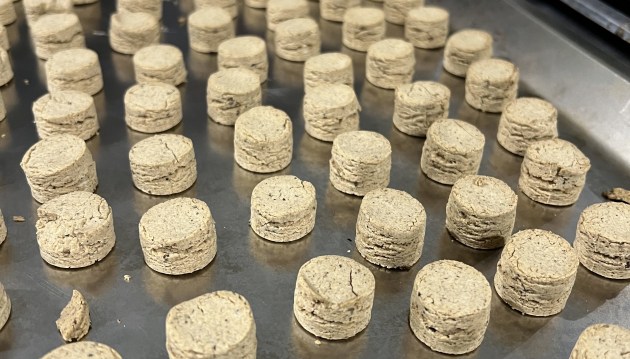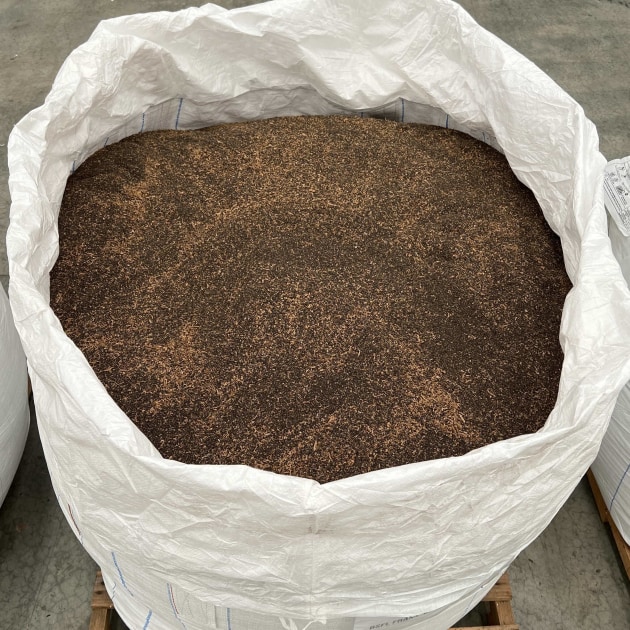On the outskirts of Melbourne, food tech company Viridian Renewable Technology has developed a proprietary manufacturing process to transform excess food into highly nutritious, easily digestible premium insect protein. As Viridian undertakes a $5 million capital raise, Food & Drink Business visits its Derrimut facility to see just how it works.
Fly larvae, Black Soldier Fly larvae to be specific, are how Viridian is creating some of the most circular protein ingredients available.
Viridian chair, Professor Paul Wood, says the company’s goal is to provide a missing link in the food production system, to create a truly circular economy where there’s yet to be any other solution.
“There’s no real solution at both ends. We’re not about to ship food waste to China for processing, that didn’t work very well with plastics. And we can’t import the insect protein due to biosecurity restrictions. We’ve got to solve the problem locally,” Wood said.
The process starts with excess pre-consumer food from manufacturers, and the fly larvae. Managing director Martin Pike said that already sets Viridian apart from other insect protein operations.
“The food materials we use aren’t food waste, we’re using high quality food inputs such as the excess bread at the end of the day from bakery businesses like Bakers Delight. It enables us to produce consistently high quality, clean protein ingredients,” Pike said.
“With our end-to-end production system, we then farm and process the larvae into a fresh-frozen meat block or cook them to create various dried ingredients. The meat block is a special product because it works just like other meats used by pet food producers, having great palatability and functionality, without requiring changes to the final product’s manufacturing process. It’s used by pet food manufacturers in wet food formulations.”
The dried products start with whole, dried larvae, which are sold to chicken and bird fanciers as a protein supplement. Viridian is also working with the aquaculture industry, using a proprietary process to fractionate the dried larvae into a protein powder and oil for a complete or partial replacement for fishmeal resulting in no loss in yield or fish health.
The current market

“The protein meal is used currently by pet food manufacturers for treats and kibbles and we have started supplying fish feed manufacturers. The oil is a good source of healthy fats for pets and we are also providing it to the soap manufacturing industry,” Pike said.
Viridian launched its own pet food brand, One with Everything, which it sells through its website and numerous retailers like PETstock.
Pike and the Viridian team have also been working with several pet food brands on a range of novel formats. In one project with Planet A Pet Food, the insect protein is incorporated into a premium chunky dry kibble alternative, which pet owners reconstitute. It is another aspect to its low carbon footprint, with a pack weighing 250 grams being shipped rather than 1 kilo packs of wet food.
“We are seeing tangible health benefits from the bioactive compounds in the protein that are rich in anti-inflammatory and anti-aging antioxidants. It has exceptionally high digestibility and has been show to benefit gut health.
“The insect oil is a great source of medium chain triglycerides, which does wonders for the dog’s coat. They are true superfood ingredients,” Pike said.

In addition, for every five tonnes of food input, there is one tonne of frass – larvae manure – output. This all-natural nutrient-rich product is seen as a superfood fertiliser. It is an effective alternative to traditional synthetic fertilisers that improves soil health, rather than degrade it over time.
“The frass contains insect skins that are a rich source of a compound called chitin. This boosts plant immune systems and also provide nutrients for the soil microbiome. We have farmers trialling its use in Victoria and the results are remarkable in terms of crop quality, health, and pest resistance. Through a partnership with Vasili’s Garden, our frass is also being blending into domestic fertiliser products for home gardeners,” Pike said.
But not all frass is created equal, with consistency, flowability, and biological stability being three main concerns that Viridian has addressed with its technology. Pike said it’s why the company produces frass to IPIFF EU Standards, ensuring its high quality and safety.
Growth and perceptions
“We have a nutritious, truly circular protein source that we can grow – and scale – with the technology we have designed, taking up a very small footprint compared to traditional agriculture. And we are finding that consumers are very comfortable feeding it to their pets, especially once they see the reaction from their four-legged friends,” Pike said.
Wood added, “We need to know about waste management, we need to know about insects and their value, but in the end, to be a successful business, we have to handle those materials appropriately and turn them into products that customers want. This is the advantage of our manufacturing process. At the moment, that interest is from the petfood market, so we’re working with our customers to provide bespoke, highly beneficial products that are being well received.”
But the company recognises the narrow space it occupies in the capital market.
“It’s not human health, it’s not traditionally animal health, and it’s sort of recycling. It means we’re looking for a special group of people that is looking for an impact investment,” Wood said.
Pike said the company is in contact with pet food makers around the world, and local aquaculture producers, but are stymied by not being able to provide enough tonnage to meet demand because of the capital requirements for industrial scale manufacturing.
“We have the process and technology mastered, now it’s just a matter of scaling the solution with more factories,” he said.
Editor’s comment: It is a curious time we live in, more than one third of Australian households are affected by food insecurity; we create more than 7.6 tonnes of food waste every year, of which around 70 per cent is perfectly edible; and there is a ‘humanisation’ trend in the $3 billion pet food industry that has a compound annual growth rate of 2.7 per cent – so we’re wasting edible food, feeding human grade food to our pets, and letting 3.7 million households go hungry every year.
Meanwhile, companies like Viridian and Eighth Day Foods are researching and advancing real solutions to the pressing questions of our future food systems. Here’s hoping those holding the investment purse strings see the change their investment could yield.








